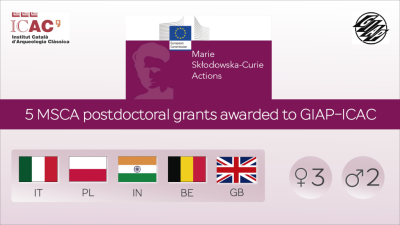
¡Éxito destacado de nuestras solicitudes de MSCA para la convocatoria 2021!
El grupo GIAP del ICAC ha obtenido cinco nuevas ayudas postdocorales MSCA de la Comisión Europea, que anunció la resolución de la convocatoria 2021 el pasado lunes 21 de marzo. Una sexta propuesta, además, se ha colocado en la lista de reserva.
Un reconocimiento a la excelente tarea hecha por el GIAP y que permitirá una aportación de fondos para la investigación por un valor total de casi 900.000 euros, en las áreas de arqueobotánica, inteligencia artificial, arqueología computacional, arqueología de la alimentación, geoarqueología y teledección.
Además de las oportunidades de investigación obvias que representan los nuevos proyectos, especialmente para nuestras líneas de investigación en arqueobotánica, teledetección y computación, también serán un enriquecimiento del carácter marcadamente internacional del grupo GIAP, con nuevos investigadores e investigadoras de alrededor de Europa y del mundo.
Podéis leer a continuación la información general sobre las propuestas que han sido guardonadas por la CE con una ayuda postdoctoral MSCA en la convocatoria 2021.
1. IArchMap: Intelligent Archaeological Mapping of Long-Term Settlement in Punjab
- Candidato: Dr. Aftab Alam (India)
- Supervisores: Dr. Arnau Garcia-Molsosa y Dr. Hèctor A. Orengo
Resumen de la propuesta:
Intelligent Archaeological Mapping of Long-Term Settlement in Punjab (IArchMap) will develop a new workflow for archaeological regional surveys through the application of machine learning methods to historical maps, multitemporal multisource satellite data and drone-acquired high-resolution imagery. These will be tested and complemented by field ground-truthing and analysis of field material. This new methodological approach will allow archaeologists to map and characterise information on past human settlement over large areas with an unprecedent speed and accuracy.
2. NetFoodIt: Networking food plant imports in Roman Italy
- Candidata: Dr. Federica Riso (Italia)
- Supervisores: Dr. Alexandra Livarda y Dr. Hèctor A. Orengo
Resumen de la propuesta:
The emergence of the Roman Empire marked a series of significant political and socio-economic changes across modern-day Italy as well as across a very large part of modern-day Europe. Among these, the establishment of a new transport network and the development of trade and commerce that this facilitated, was one of the most important and lasting changes.
NetFoodIt aims at using imported food plants, for the study of Roman transport and movement and the socioeconomic dynamics that this established within the core of the Roman Empire and its broader surroundings, that is, across modern-day Italy. In doing so NetFoodIt will shed new light into the relation between mobility, commerce and the introduction of new tastes in Roman Italy.
3. PlantNetGem: Exploring the process of urbanisation in the Roman provinces of Germania through the study of food plant commerce
- Candidata: Dr. Patricia Vandorpe (Bélgica)
- Supervisores: Dr. Alexandra Livarda y Dr. Hèctor A. Orengo
Resumen de la propuesta:
The arrival of the Romans in large parts of current Europe had a major impact on society, with the creation of a new transport network and the development of cities being two of the most significant and lasting changes. However, so far, little work has been done to quantify and understand the connection between cities, how the netwrok developed and its lasting consequences.
Through the study of imported/introduced food plants into the provinces of Germania in the Roman period, PlantNetGem aims to contribute to a better understanding of foodways and the role of transport and commerce in the development of the population nuclei in this area.
4. SIGNATURE: Mapping endangered cultural soilscapes in post-conflict regions through Big Earth Observation Data, artificial intelligence and geoarchaeological signatures
- Candidato: Dr. Sayantani Neogi (Regne Unit)
- Supervisores: Dr. Francesc C. Conesa y Dr. Hèctor A. Orengo
Resumen de la propuesta:
SIGNATURE aims to investigate the long-term settlement and land-use dynamics that shaped the cultural soilscapes of the Levant, with a particular emphasis on revealing new archaeological sites that have been obscured by recent agricultural encroachment and abrupt land disturbances.
The study area encompasses the endangered archaeological landscapes of the Bekaa Valley in Lebanon and its adjacent fertile plains between the Litani and Orontes rivers. As an aftermath of the Lebanese Civil War and the long-lasting conflict spillovers that followed, the traditional agronomic landscapes of the Bekaa were severely transformed by agricultural autarky.
5. UnderTheSands: Ancient irrigation detection and analysis using advanced remote sensing methods
- Candidata: Dr. Nazarij Buławka (Polonia)
- Supervisor: Dr. Hèctor A. Orengo
Resumen de la propuesta:
Ancient irrigation systems are probably the first human large-scale landscape modifications. The analysis of the ancient irrigation systems that gave rise to and sustained the first urban civilisations goes well-beyond the study of ancient irrigation to touch topics such as climate change, sustainability, population dynamics, and ancient economy, all at the core of urbanisation as a deeply human phenomenon, perhaps the most important change in the history of humanity.
For many decades ancient water management research in archaeology was mainly focused on the Near East and surrounding regions with similar hydroclimatic conditions. The political situation in that region and, as a consequence, the lack of new data nearly stopped further scientific activities.





